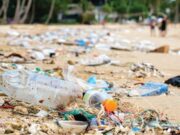Waste Management
Home Waste Management
 From the guestroom to the loading dock, waste is a perpetual challenge for hoteliers. Fortunately, there are many ways to reduce waste—through intelligent purchasing, packaging, recycling and education. Got a great idea about how to turn green into gold? Contact Glenn Hasek, editor, at (813) 510-3868, or by e-mail at: greenlodgingnews@gmail.com.
From the guestroom to the loading dock, waste is a perpetual challenge for hoteliers. Fortunately, there are many ways to reduce waste—through intelligent purchasing, packaging, recycling and education. Got a great idea about how to turn green into gold? Contact Glenn Hasek, editor, at (813) 510-3868, or by e-mail at: greenlodgingnews@gmail.com. Portola Hotel & Spa Named First Surfrider Ocean Friendly Hotel in Monterey County
MONTEREY, CALIF.—Portola Hotel & Spa says it’s the first hotel in Monterey County to be recognized as a Surfrider Foundation Ocean Friendly Hotel, reinforcing its longstanding commitment to sustainability and ocean conservation along California’s Central Coast. Surfrider’s Ocean Friendly Hotels program celebrates properties that make meaningful, measurable efforts to protect the ocean and coasts by reducing single-use plastics and conserving water onsite.
“Protecting Monterey Bay and our surrounding marine ecosystem has always been at the heart of who we are,” said Janine Chicourrat, Managing Director of Portola Hotel & Spa. “We’re proud to be recognized as a Surfrider Foundation Ocean Friendly...
Frontline International Introduces FOG Machine
CUYAHOGA FALLS, OH—Getting lost in the FOG? When your foodservice operation generates all of the “Big 3”—fats, oils, and grease—a one-size-fits-all collection solution can seem out of reach. No more. Frontline International’s FOG Machine is the only equipment you need. It collects FOG waste generated by a wide range of cooking apparatus including cooking oil fryers, combi ovens, convection ovens, and other commercial ovens.
This is the answer that large, decentralized foodservice operations have been looking for. Supercenters, malls, sports stadiums with concession stands, conference centers, airports, casinos, colleges and universities, and more can all benefit. It comes from Frontline...
Winnow Now Saving Operators $100 Million in Food Waste Per Year
LONDON—Leading hospitality groups including Hilton, Accor, Marriott, Mandarin Oriental and IKEA are now collectively saving more than $100 million a year by cutting food waste across their kitchens—enabled by AI-powered food waste tracking from Winnow.
The milestone reflects growing momentum in the sector to address one of hospitality’s most persistent challenges. Globally, food waste represents an estimated $1 trillion in economic loss each year, with $147 billion attributed to surplus food in the U.S. foodservice sector alone (source: UNEP, ReFED). Winnow’s mission is to help the hospitality industry recover $1 billion of that loss by giving chefs the tools to...
ADA Cosmetics Refillution Named Finalist for German Sustainability Award
KEHL, GERMANY—Bold innovation, measurable impact. A true game-changer for the hospitality industry, ADA Cosmetics Refillution raises the bar for sustainability in hotel bathrooms worldwide. Now the automated, fully traceable refill system is named as a 2025 finalist in the Resources category of the prestigious German Sustainability Award—recognizing a transformative product that is making an impact internationally.
Widely recognized across Europe and beyond, the German Sustainability Award (Deutscher Nachhaltigkeitspreis) has established itself as a benchmark for corporate sustainability excellence.
Europe’s largest and most respected sustainability award, supported by the German government, is the country’s premier platform for recognizing sustainable product breakthroughs across...
Sustainable Product Highlights from Boutique Design New York
NEW YORK—Boutique Design New York (BDNY) wrapped up at the Javits Center in New York on November 10 after a two-day event that featured 750 exhibitors and drew 16,000 industry professionals.
Featured were innovations in boutique hospitality design, including new furniture, lighting, and textiles, and accredited sessions focused on topics like AI, wellness, sustainability, and the future of luxury.
In the Best of BDNY Product Design Competition’s Sustainable category, the winner was Daltile’s Panoramic Black Diamond.
On the trade show floor there were hundreds of collections with robust sustainability stories. It would be impossible to list them all here but the following...
Hard Rock International & Seminole Gaming Partner with Ocean Conservancy for Second Annual Global Sound Waves Program
HOLLYWOOD, FLA.—For the second consecutive year, Hard Rock International and Seminole Gaming joined forces with nonprofit organization Ocean Conservancy for the Global Sound Waves joint sustainability program. This collaboration unites Hard Rock team members and communities worldwide with Ocean Conservancy’s mission of protecting the oceans by reducing waste and driving meaningful environmental change.
The partnership, motivated by one of Hard Rock’s guiding mottos: Save the Planet, takes a proactive approach to ocean conservation by focusing on upstream waste management, addressing water, food, and material waste to prevent it from polluting the ocean. Through comprehensive waste audits and data-driven analysis, Hard Rock and Ocean...
Tarkett Launches Resonant Spaces Ethos Carpet Tile Collection
SOLON, OHIO—Tarkett, the global flooring company known for innovative and sustainable flooring solutions, has launched its Resonant Spaces collection. First introduced at Design Days 2025, Resonant Spaces is the company’s most anticipated workplace carpet tile collection of the year, creating work environments that support positive energy and provide havens where people feel engaged, empowered and comfortable.
“Something wonderful happens when a space resonates with you. There’s an invisible flow of energy that harmonizes with your own—a certain magnetism that connects on a personal level to spark creativity and deepen focus. The Resonant Spaces collection builds on these invisible dynamics to shape...
Summit’s Ongoing Progress Detailed in New Corporate Responsibility Report
For those of you not familiar with Summit Hotel Properties, Inc., it is a publicly traded real estate investment trust (REIT) focused on owning premium-branded hotels with efficient operating models primarily in the upscale segment of the lodging industry. As of December 31, 2024, the company’s portfolio consisted of 97 hotels, 53 of which were wholly owned, with a total of 14,557 guestrooms located in 25 states.
As a REIT, Summit Hotel Properties partners with premium hotel brands, including Marriott International, Inc., Hilton Worldwide, Hyatt Hotels Corp., InterContinental Hotels Group and leading third-party property management companies to operate its lodging...
BOKSER Textiles Launches Sheeting Collection with CiCLO
MINNEAPOLIS—BOKSER Textiles, a premier supplier of high-performance hospitality textiles, is taking a major step into sustainable bedding with the launch of its Vermilion Sheeting Collection. This new line, blending 52 percent Polyester infused with CiCLO technology and 48 percent Modal, provides hotels with an advanced solution to two of the biggest challenges in hospitality: reducing carbon emissions and tackling microplastic fiber pollution—tiny plastic particles that can enter waterways from washing fabrics.
Hotels face unique sustainability pressures: constant laundry, high occupancy, and increasing guest expectations for eco-conscious practices. The Vermilion Sheeting Collection enables hotels to deliver the quality guests expect while...
ADA Cosmetics Presents Redesigned BOGNER Hotel Collection
KEHL, GERMANY—Style, innovation, and sustainability converge as ADA Cosmetics unveils a striking redesign of its luxurious BOGNER hotel collection, designed for discerning boutique hotels worldwide.
With sleek silhouettes, a snow-fresh color palette, and refined details, the new design mirrors BOGNER’s approach to fashion, offering the perfect balance of performance and elegance.
Design That Embodies Pure Style
“BOGNER is more than functional sportswear—it is a statement of modern life in motion,” says Daniel Hiendlmeier, Chief Brand Officer and Managing Director at BOGNER. “Our collections epitomize sportive elegance—a seamless fusion of athletic energy and refined sophistication, and we recognize the value of leisure to well-being....









